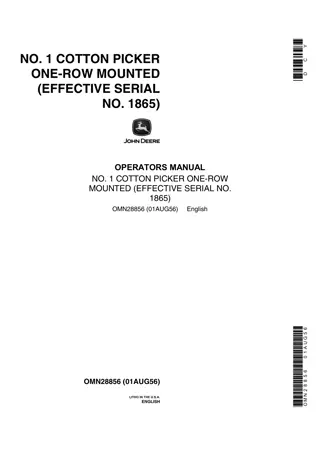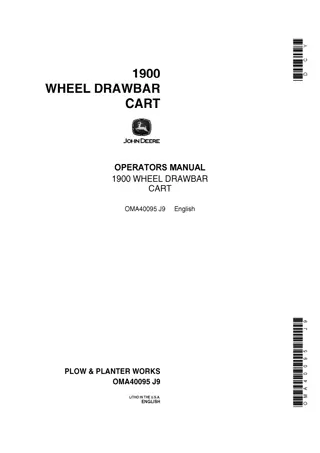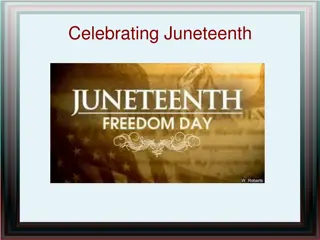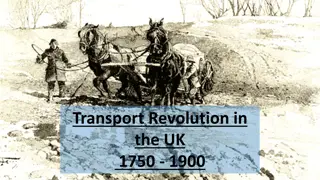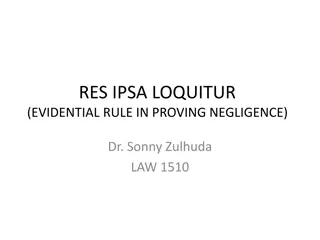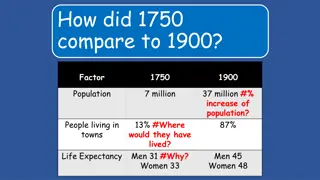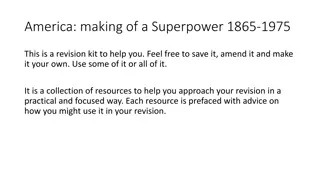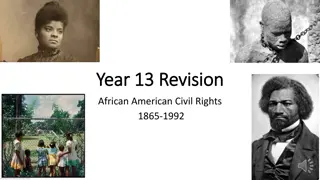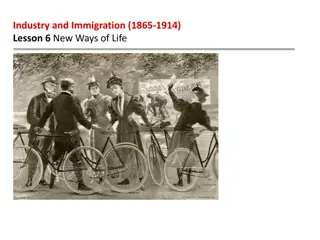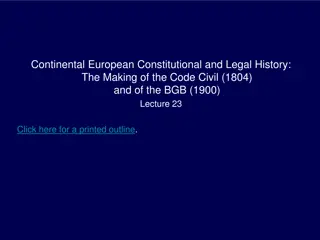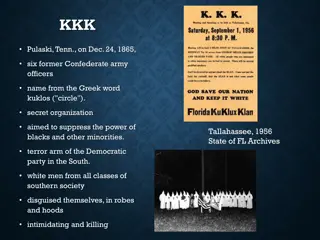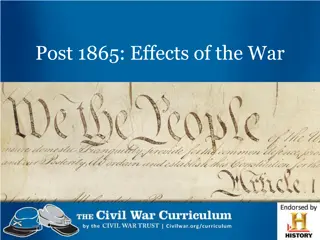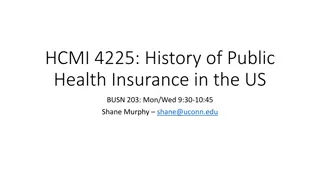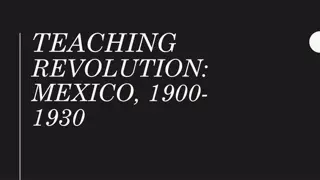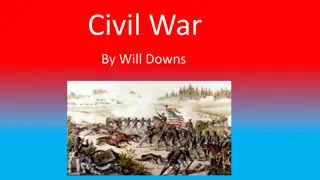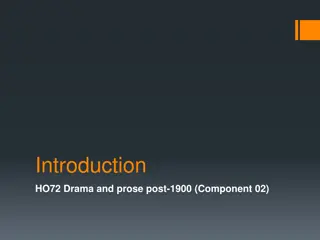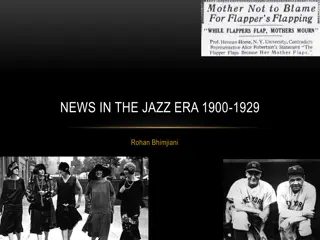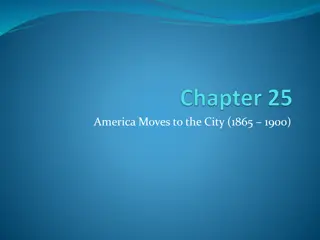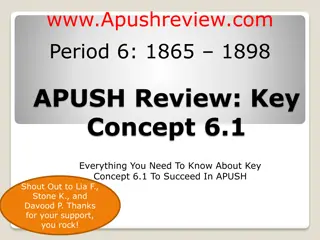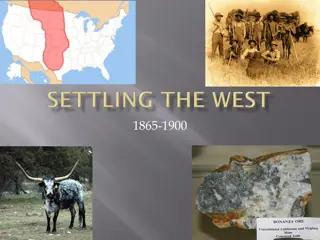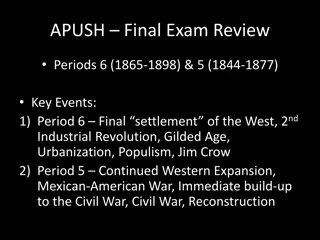The Psychology of Custom Packaging Guide – 2024
Before understanding the psychology of custom packaging, it is vital to understand the background of packaging. It is assessed that glass and wood packaging have been used for something like 5000 years. In 1823, the very first British bloke, Peter Durand, got the patent for metal packaging produced
1 views • 5 slides
Global Climate Models
Scientists simulate the climate system and project future scenarios by observing, measuring, and applying knowledge to computer models. These models represent Earth's surface and atmosphere using mathematical equations, which are converted to computer code. Supercomputers solve these equations to pr
3 views • 15 slides
Understanding Taxonomies in Sustainable Development
Explore the significance of taxonomies in relation to indicators for sustainable development goals (SDGs) and the EU Taxonomy for sustainable activities. Learn how indicators are defined, their role in evaluating economic and environmental activities, and the importance of a standardized taxonomy fo
12 views • 47 slides
John Deere 1900 Seeding Tiller Operator’s Manual Instant Download (Publication No. OMW21385)
Please open the website below to get the complete manual\n\n\/\/
0 views • 20 slides
John Deere NO.1 Cotton Picker One-Row Mounted Operator’s Manual Instant Download (Effective Serial No.1865) (Publication No.OMN28856)
Please open the website below to get the complete manual\n\n\/\/
0 views • 22 slides
John Deere 1900 Wheel Drawbar Cart Operator’s Manual Instant Download (Publication No.OMA40095)
Please open the website below to get the complete manual\n\n\/\/ \n
0 views • 18 slides
Understanding Juneteenth: A Celebration of Freedom and Resilience
Juneteenth, short for June 19, marks the end of slavery in the US and celebrates the emancipation of enslaved people in Texas in 1865. This holiday honors African Americans' fight for freedom and highlights resilience, progress, family bonds, and the joy of life. Explore the historical significance
1 views • 14 slides
Understanding Juneteenth: An Overview of Historical Significance
Juneteenth, celebrated on June 19th, marks the end of slavery in the United States in 1865. Initially met with resistance, it has seen a resurgence, especially during the Civil Rights movement. It is not the same as Emancipation Day. Learn about its history and importance today.
0 views • 11 slides
Transport Revolution in the UK 1750-1900: A Historical Perspective
Explore the challenges and transformations of Britain's transport network from 1750 to 1900. Delve into the problems faced, reasons for change, and necessity for adaptation. Engage in activities to enhance understanding of the transportation evolution during this period.
0 views • 16 slides
Understanding Res Ipsa Loquitur in Proving Negligence
Res Ipsa Loquitur is a legal principle where the occurrence of an accident implies negligence on the part of the defendant. It shifts the burden of proof to the defendant, requiring them to explain the incident's cause. Originating from the Scott v London case in 1865, this principle has been applie
6 views • 19 slides
Comparing 1750 to 1900: Population Growth in Britain
The population of Britain saw a significant increase between 1750 and 1900. In 1750, the population was 7 million, and by 1900, it had grown to 37 million. This represented an 87% increase. The number of people living in towns also rose from 13% to a higher percentage. Factors contributing to this g
0 views • 6 slides
America's Evolution into a Superpower: 1865-1975 Revision Kit
Explore the comprehensive revision kit for America's transformation into a superpower from 1865 to 1975. Includes grids, mind maps, and insights on key political, social, economic, and foreign policy developments. Enhance your understanding of crucial events and themes shaping American history durin
0 views • 19 slides
A Guide to WJEC A-Level English Literature Unit 2 Poetry Post-1900 CPD
Explore the assessment objectives, principal examiner's reports, and tips for balancing the AOs in the Unit 2 poetry post-1900 CPD exam. Understand the importance of addressing all five AOs and maintaining a balanced approach in your essays. Dive into advice on structure, detailed analysis, and effe
0 views • 20 slides
African American Civil Rights Movement: 1865-1992 Revision Guide
Thematic study on the African American Civil Rights Movement from 1865 to 1992 discussing social, economic, and political aspects. Exam tips, black leaders' impact, and essential revision books highlighted for comprehensive understanding. Key figures like Dr. King, Booker T. Washington, and Ida B. W
1 views • 5 slides
Evolution of Soldier Recruitment and Training from 1700 to 1900
Soldier recruitment and training methods between 1700 and 1900 underwent significant changes, with men signing up for short enlistments or life service with incentives like steady pay and bounties. However, challenges such as poor quality soldiers, disciplinary issues, and desertions persisted. Othe
2 views • 13 slides
The Salvation Army's Fight Against Human Trafficking
The Salvation Army, founded in London in 1865 by Rev. William Booth and his wife Catherine Booth, has been actively combating human suffering, including human trafficking. Today, the organization operates various programs and initiatives globally, including Project FIGHT in Raleigh and the Stop-It P
2 views • 12 slides
New Ways of Life: Industry and Immigration (1865-1914) Lesson
Explore how technology, new stores, and marketing revolutionized Americans' standard of living in the late 1800s. Delve into mass culture, education, and popular cultural movements of the era. Discover key terms like Mark Twain, Gilded Age, conspicuous consumerism, and more.
0 views • 16 slides
The Making of the Code Civil (1804) and the BGB (1900)
This lecture provides a historical overview of the development of two significant civil codes - the French Code Civil of 1804 and the German BGB of 1900. It explores the political events in France and Europe from 1750 to 1815, leading up to the creation of these codes amidst revolutionary movements
2 views • 53 slides
The Civil War: Key Facts and Insights
The Civil War, one of the bloodiest conflicts in history, was fought from April 1861 to Spring 1865. Triggered by the divergence on slavery between the Northern and Southern states, over 22 million people were involved, resulting in over 650,000 casualties. Learn about the war's origins, major battl
0 views • 16 slides
Key Events in American History Illustrated
Explore significant moments in American history through visual representations, including the founding of Jamestown in 1607, the signing of the Mayflower Compact in 1620, the writing of the Declaration of Independence in 1776, and the Louisiana Purchase in 1803. Learn about the Constitution of the U
0 views • 11 slides
Exploring the World of Domestic and Sentimental Fiction (1820-1865)
Discover the world of domestic and sentimental fiction that captivated women during the 19th century in America. Dive into the plots, characters, and themes that defined this influential genre, exploring the journey of young heroines facing trials, triumphs, and the importance of self-mastery.
0 views • 15 slides
Chasing Lincoln's Killer: A Historical Account of the Assassination
In "Chasing Lincoln's Killer," author Alexandra Chiarappa delves into the events leading up to and following Abraham Lincoln's assassination. The prologue sets the stage with Booth's growing anger towards Lincoln, culminating in the fatal night of April 14th, 1865. Booth meticulously plans the assas
0 views • 16 slides
History and Impact of the Ku Klux Klan in the United States
The Ku Klux Klan (KKK) is a notorious secret organization founded in Pulaski, Tennessee, in 1865 by former Confederate army officers. Originally aimed at suppressing the power of blacks and minorities, the KKK evolved over the years with a goal to reestablish white supremacy. The Klan was responsibl
0 views • 5 slides
Tragedy of the Sultana and Lincoln Assassination in 1865
The sinking of the Sultana, a steamboat, in 1865 resulted in one of the deadliest maritime disasters in U.S. history, yet it remains relatively obscure. The tragic event occurred in the midst of other significant occurrences, like the assassination of President Lincoln by J. Wilkes Booth. The overcr
0 views • 12 slides
Post-1865: Effects of the Civil War and Reconstruction Efforts
The post-Civil War era saw varied approaches to Reconstruction, including Lincoln's Ten Percent Plan, the Republican-controlled Congress's more stringent measures, Andrew Johnson's lenient policies, and the demands of the Radical Republicans. This period involved significant political and societal c
0 views • 6 slides
History of Public Health Insurance in the US: Understanding Federal Expenditure Before 1900
Explore the historical development of public health insurance in the US, focusing on federal expenditure before 1900. Topics covered include Civil War implications, Freedmen's Bureau, pensions, mutual aid organizations, and early welfare states. The narrative delves into the Civil War era, internal
0 views • 83 slides
Teaching Revolution in Mexico: Exploring the 1900-1930 Period
Explore the intricacies of the Mexican Revolution from 1900 to 1930 through sessions, discussions, and timelines. Delve into the international influences, teaching strategies, and resources related to this historical event. Understand how historical revolutions can shed light on modern issues and in
0 views • 16 slides
The Civil War: Causes, Battles, and Impact
The Civil War started in 1861 due to the issue of slavery in the United States. It lasted from 1861 to 1865 and resulted in significant bloodshed, with key battles like Gettysburg and Antietam. Despite the North's advantages in population and resources, the Confederates put up a stubborn resistance.
0 views • 16 slides
The Rise of the KKK: Origins, Objectives, and Decline
The Ku Klux Klan (KKK) was founded in Pulaski, Tennessee, in 1865 as a social club for former Confederate soldiers. Over time, it evolved into a terrorist organization with the goal of discouraging black people from holding positions of power and enforcing segregation through fear and violence. Desp
0 views • 13 slides
Pre-1900 Love Poetry: The Big Picture
Explore the world of love poetry before 1900 through the lens of John Wilmot, Earl of Rochester. Delve into his life, works, and influence, reflecting the poetic trends of the era. Uncover the complexities of love, society, and expression in historical context, preparing to analyze and appreciate th
0 views • 28 slides
Study of Modern Drama and Prose Post-1900
This component focuses on the study of a modern play (The History Boys) and a modern prose text (The Great Gatsby). Learners explore cultural and contextual influences on writers and readers, analyze literary texts, demonstrate understanding of contexts, and make connections across texts. The examin
0 views • 23 slides
Media and Entertainment in the Jazz Era: 1900-1929
The Jazz Era of 1900-1929 witnessed the development of entertainment through iconic theaters like Orpheum and Keiths, driven by popular figures like Houdini. Women fought for suffrage rights, leading to significant social shifts. The Roaring Twenties brought about a time of wealth, cultural change,
0 views • 9 slides
Urbanization and Immigration in America (1865-1900)
America experienced significant urbanization and immigration between 1865 and 1900. Cities grew rapidly, attracting people from rural areas seeking industrial jobs and economic opportunities. The influx of immigrants from Southern and Eastern Europe brought about social tensions and challenges, as t
0 views • 15 slides
Rise of Big Business in the United States: Key Concepts and Impact
The period 1865-1898 saw the rise of big business in the United States, leading to massive migrations, urbanization, and debates over national identity. Key Concept 6.1 explores the relationship between businesses and government, reasons for internal migration and immigration, and changes in the Sou
0 views • 9 slides
Evolution of Children's Literature in English: From Alice to Modern Times
Explore the birth of modern children's literature starting with the publication of "Alice's Adventures in Wonderland" in 1865 by Charles Dodgson (Lewis Carrol), marking a shift towards entertaining and engaging literature specifically for children. Prior to this, children mainly read folklore and ad
0 views • 35 slides
Expansion and Innovation: Mining, Ranching, and Settlement in the American West (1865-1900)
Explore the evolution of the mining industry, the impact of new technologies on open-range ranching, and the significance of heavy investments in the cattle industry on the United States economy during the late 19th century. Delve into the richness of silver, gold, and copper deposits, the challenge
0 views • 16 slides
Global Imperialism in 1900: Expansion and Acquisition
Explore the expansionist endeavors of nations in 1900, including the US acquiring Alaska and Hawaii, as well as European control in China through spheres of influence. Delve into the motivations, controversies, and impacts of these imperialistic actions that shaped the geopolitical landscape of the
0 views • 16 slides
Understanding Sectionalism and Nationalism in 19th Century America
Explore the development of sectionalism and nationalism in the United States from 1820 to 1865, focusing on the differences between the North and South, the impact of industrialization and transportation on society, sources of unity and nationalism, and key Supreme Court cases strengthening the fede
0 views • 17 slides
Key Events and Impacts of Periods 5 and 6 in US History
The content covers key events and impacts of Periods 5 (1844-1877) and 6 (1865-1898) in US history. It includes the settlement of the West, the 2nd Industrial Revolution, the Gilded Age, urbanization, populism, Jim Crow laws, Western expansion, the Mexican-American War, Civil War, and Reconstruction
0 views • 42 slides
Understanding Res Ipsa Loquitur in Negligence Law
Res Ipsa Loquitur is a legal principle where the occurrence of an accident implies negligence by the defendant. This doctrine creates a presumption of fault against the defendant, who must then offer an explanation to rebut this presumption. The case of Scott v. The London and St. Katherine Docks Co
0 views • 15 slides




